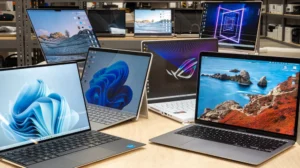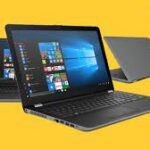In today’s digitally-driven world, a laptop has evolved into a quintessential tool, serving myriad purposes, from professional to recreational. The quest to buy the ideal laptop can seem like navigating a labyrinth, especially given the plethora of options available. This comprehensive guide aspires to be your “Best laptop buying guide for students 2023” while also catering to professionals and general users. Dive into the nuances of the critical laptop features to check before buying, learn how to choose the right laptop for your needs, and become privy to some common pitfalls to avoid. You may also like this Things To Consider Before Buying a Laptop

Purpose: Why Are You Buying a Laptop?
Understanding your precise need is foundational to How to choose the right laptop for your needs.
- For General Use: Casual users who mainly browse the web, stream videos, check emails, and use basic office applications don’t need top-tier specifications. A mid-range laptop would be sufficient.
- For Gaming: Gamers need machines that can keep up with high-end graphics and fast-paced scenarios. Speed, graphics, and a high-refresh-rate screen are essential.
- For Work or Professional Use: This is your “Laptop buying checklist for professionals.” Those in graphic design, video editing, or 3D modeling will require robust specs, while others in data entry or basic programming might require less.
- For Study: Attention students, with this being touted as the “Best laptop buying guide for students 2023”, the primary focus should be reliability, durability, and longevity. Essential software compatibility and multitasking capability also play a pivotal role.
Operating System (OS)
Your OS is pivotal to your user experience and determines software compatibility.
- Windows: Windows laptops are versatile and offer a broad compatibility range. With frequent updates, they remain at the forefront of new technologies.
- MacOS: Apple’s ecosystem boasts of seamless integration, top-notch security, and a user-friendly interface. It’s a favorite among many designers and creatives.
- Linux: Linux is preferred by developers due to its open-source nature. It’s customizable, but it might present a steeper learning curve for beginners.
Specifications: A Deep Dive
Grasp the Critical laptop features to check before buying.
- Processor (CPU): Think of the CPU as your laptop’s brain. Intel’s Core series (i3, i5, i7) and AMD’s Ryzen are popular choices. The higher the number, the more processing power – essential for heavy-duty tasks.
- RAM: RAM determines your laptop’s multitasking prowess. For general tasks, 8GB is standard. However, 16GB or 32GB may be needed for resource-intensive tasks.
- Storage: HDDs offer more storage but are slower and bulkier. SSDs are faster and more durable but might come with a heftier price tag. Many users opt for a combination, using SSD for the OS and critical apps, and HDD for storage.
- Graphics: Integrated graphics (where the GPU is combined with the CPU) are standard and suitable for everyday tasks. However, a dedicated GPU, from brands like NVIDIA or AMD, is necessary for gaming or professional design and video work.
Battery Life and Performance
Battery longevity can make or break your experience, especially for those always on the move.
- General Use: For tasks like browsing or streaming, 5-7 hours suffices for most.
- Heavy Use: Power users should aim for 10 hours or more. Remember, screen brightness, active apps, and resource usage can drain the battery faster.
Budget and Value
The spectrum of laptop prices is vast, and striking a balance between price and performance is paramount.
- Low-End (Budget): Typically under $500, they handle basic tasks adeptly.
- Mid-Range: Priced between $500-$1000, these devices offer a harmonious balance between performance and cost, suitable for the majority of users.
- High-End: Surpassing the $1000 mark, these are powerhouses tailored for specific needs or those seeking a luxury experience.
Size, Weight, and Portability
Your laptop’s physical attributes directly impact usability.
- Light & Portable: 11-13 inches, ideal for frequent travelers or students. These often weigh under 3 pounds.
- Medium: 14-15 inches, striking a balance. They weigh between 3-5 pounds and are suited for both work and play.
- Large: 16-17 inches, these are bulky but offer expansive screens, suitable for gamers or professionals needing large display areas.

Brands, Warranty, and Support
Your laptop’s longevity and post-purchase experience hinge on these aspects.
- Brands like Apple, Dell, HP, Lenovo, and Asus have established trust over time. But newer brands might offer competitive features at a lesser price.
- Warranty periods and terms differ. Opt for extended warranties or insurance for peace of mind.
- Customer support can be a lifesaver. Brands with commendable support can alleviate post-purchase woes.
Aesthetics and Build Quality
While functionality reigns supreme, the look, feel, and durability of a laptop also matter.
- Materials: Laptops are typically made from plastic, aluminum, or magnesium alloys. Each has its weight, durability, and aesthetic implications.
- Design: From sleek ultrabooks to RGB-laden gaming machines, design can be a decisive factor for many.
Advanced Features and Futureproofing
Incorporating future technological advances can ensure longevity.
- Ports: USB Type-C, Thunderbolt 3, HDMI, and card readers might all be crucial depending on your needs.
- Expandability: Can you upgrade RAM or storage in the future? This can dramatically increase a laptop’s lifespan.
- Connectivity: Wi-Fi 6 support, Bluetooth version, and other wireless technologies can influence your experience.
Top Mistakes to Avoid When Purchasing a Laptop
Educate yourself and sidestep these pitfalls.
- Overbuying: Investing in the highest specs without a clear need can drain your wallet without tangible benefits.
- Underestimating Needs: Conversely, skimping on necessary features can lead to early obsolescence.
- Ignoring Ports and Compatibility: Ensure the laptop supports your peripherals and future accessories.
Conclusion
Navigating the world of technology, especially when purchasing a laptop, can feel like deciphering a complex code. However, with the right information and a clear understanding of your unique needs, this process can be simplified and even enjoyable. Remember, the ideal laptop isn’t about having the most cutting-edge specs or being the priciest; it’s about meeting your requirements and ensuring longevity and satisfaction. In a rapidly evolving tech landscape, making an informed choice is more crucial than ever. So, equip yourself with knowledge, assess your needs, and you’ll undoubtedly find a laptop that feels custom-made for you.


